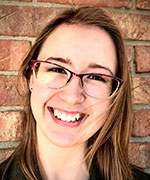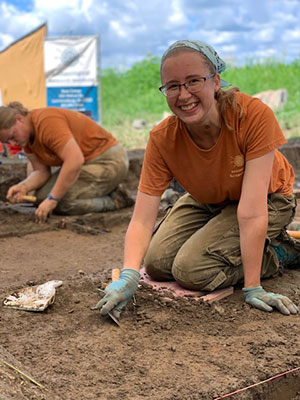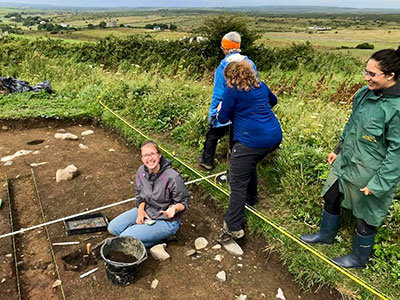
- senior double major in Anthropology and Art History
- minors in Archaeology and Museums in Society
- from Dayton, OH
- studied abroad in the Bahamas and Ireland (twice)
- conducted an Undergraduate Summer Scholars project in Ireland, at the site of an abandoned village called Toin an Tsean Bhaile
- writing a children's book about archaeology called April Wallace and the Lost Village
"Take lots of different classes…Taking various classes allows you to figure out what you like and get involved — and in my case, it broadens my experiences as I narrow down my focus and interests. Even if you don't end up choosing a particular major, you could add it as a minor. As long as you have the interest, you can make it work and figure out your niche within it."
Why Miami?
"Miami offered me a really great financial aid package, which allowed me to have money left over for pursuing all sorts of extracurricular things. I was able to study abroad three times and do lots of stuff that otherwise I would not have opportunities in, including going to the Bahamas at the end of my first semester and then to Ireland for two summers (2018 and 2019) after that.
"I applied first as an anthropology major, but I didn't really know what anthropology was until I started taking classes. Essentially, I was first determined to do archaeology and learned it's within this broader field called anthropology! It wasn't until I got into anthropology and started taking classes in linguistic, biological, and cultural anthropology that I realized, 'Holy cow, this is the stuff that I've been thinking about like my whole life that I didn't have words for!' That was a really cool moment for me."
Best Miami Experiences

Faith Walker stands next to her favorite piece in the 'Life Cycles: Death' exhibit: a Victorian mourning gown that she campaigned to borrow from the Butler County Historical Society and research for the exhibit.
"I would describe my first year as starry-eyed wonder. I remember so many possibilities in college and coming to understand that I didn't have to be in class all day, that I had time to do all these other things. My classes were super cool and interesting and engaging, full of passionate people and really great opportunities.
"First semester my freshman year I took a course on lost cities and ancient civilizations with assistant teaching professor of anthropology Jeb Card. He had this group of interns who worked with him on the department's anthropology collection, made up of lots of archaeological artifacts and materials. I asked him if I could be one of his interns to help with cleaning and digitizing and doing collections management, and he got me started basically right off the bat freshman year.
"We call Dr. Card's group of interns the Squad. After joining spring semester my freshman year I continued during the next fall semester, when I was on a team of three students who were building a digital interactive interface to introduce the department. It was essentially a kiosk map of Upham Hall depicting various hotspots around the anthropology department — here's so and so's office, here's our exhibit on Honduran artifacts, here are the labs, here's an exhibit on Kachina dolls, stuff like that. We were also getting ready to work on making a virtual museum for our 3D scans of artifacts in our collection. It was great to be a part of those preliminary preparations to make that happen!
"Adding in my art history major, I had an internship with the Miami University Art Museum curating an exhibit called 'Life Cycles: Death,' and I was able to apply a lot of my anthropology background. I also took an art history capstone class by assistant professor of art Michael Hatch in which we curated another exhibit called 'Desire, Conflict, Exchange: Art of East Asia and the West.' It was fascinating to learn all about the behind the scenes, everyday work of museums, which is a field I plan to eventually join in the future, after I join the Peace Corps."
Miami and the Liberal Arts

Faith Walker working at a 1000-year-old Fort Ancient village site in southern Indiana (Summer 2020).
"Anthropology is the study of what makes us human, and I love everything about it. Even from a very young age I've always been interested in other people, how other people sort of think and relate to others, and the meaning behind various actions and reactions. I focused on archaeology, but by no means does that indicate that I am disinterested in everything else.
"Anthropology is primarily made up of the 4 subfields of cultural anthropology, linguistic anthropology, biological or physical anthropology, and archaeology. A lot of my interest in the Peace Corps comes from my background in anthropology: working with people, understanding global needs, and really engaging at a human level. I'm excited to get involved, and I'm currently waiting on an interview — fingers crossed!
"Art history is not just the history of art, but also the exploration of why an art form, a piece of art, a creative style exists, and then the meaning that these things have among those who use them. Similar to archaeology, it's the study of how people think about things, broadly defined. Having a background in art history, especially at the global scale, and the artistic creative processes that people engage with the world around them, is very valuable in understanding the culture of a place. The fields of anthropology, archaeology, and art history really go hand in hand.
"Because of my two majors, I've learned a lot of really cool digital skills, with the help of the University Libraries. For example, in Dr. Card's Squad, I got to work with 3D scanning technologies. This is a big emerging field in archaeology because you can suddenly have incredibly detailed replicas of archaeological sites and objects and use them in teaching. You can also use them in crowdsourcing — 'I have an object, but I don't know what it is, so let's find other objects like it!'
"A lot of times when I'm researching a particular object, I look for 3D scans online using Sketchfab, which is a cool way to find museum collections and sometimes specific items for research projects. Via digital scanning and public outreach, you can now share your collections with tons and tons of people, and that's really important."
Excavating a 19th-Century Irish Village

Faith Walker works on her first site in Ireland (2018), a Bronze Age to Early Medieval era tomb. She had just found an important glass bead artifact.
"Having studied abroad three times as a Miami student is the best. Most recently, I received an Undergraduate Summer Scholarship, which is a grant-funded research project sponsored by a Miami faculty mentor. I chose to go back to Ireland to work at an excavation site in the northwest while doing an independent study project on community engagement. I was part of a team excavating at Toin an Tsean Bhaile, an 18th-19th century abandoned village from before the Great Famine.
"Working at the site gave me an understanding of its history, and it also helped give me an 'in' in terms of engaging with the local community for my research project. I was able to talk with people about their relationship to the region, to the site, and to archaeology generally. I spent a month there doing activities such as going to local art shows and talking with locals at the pub or on the bus. I even went on a community nature walk. This connected me to the area and to the people on a much deeper level than I would get just by being a tourist, and that was really cool.
"The final product of this research project, currently in its finishing stages, is a children's book, April Wallace and the Lost Village, about the site. It's about a fictional archaeologist on our site who travels back in time and meets a family that once lived there, in the village that we were excavating.
"I really care about why archaeology matters broadly and how people think about archaeology. This is especially true for Ireland, where everybody is very local and their family has been there for generations — in many cases, they're probably from that site! It's very important to me that they have a personal relationship with that location, so I make sure to acknowledge that and consider these families in the excavations and the archaeological process.
"This research project has involved a lot of public engagement, public pedagogy and scholarship. I eventually plan to work in a museum, where it's important to know how to talk to a public audience who might not know a lot about a given topic. You need to know how to engage them and make things interesting and relevant. This also just matters to me generally, as it's one of the things that makes me care about anthropology. I care about how people interact with the world around them, and talking to them prevents me from getting lost in my own world!"
Advice to Students
"Don't be picky. A lot of my college experiences were kind of accidents. For example, I'm really interested in bones, especially human bones, and the Department of Anthropology has among the largest collection of wild-caught primate skeletons in the world. So I got involved with Miami's Primatology Club, in which we cleaned, stored, and cataloged all these bones. This was a way to get experience handling bones, managing a collection, and learning a bit about museum conservation, all of which I may be able to apply in the future.
"Be flexible in what you do. I've worked really hard to find ways to tie things in with my long-term goals. A good example of this is working in the costume shop at our theater on campus. I absolutely love it — I get to continue my love for theater, it's a really good creative outlet, and I'm developing a valuable trade. I'm also able to relate theater to my interest in museums and collections because we work with a collection of thousands of historic and modern textiles in order to put on a show. Therefore, even if at first sight an opportunity doesn't seem to be what you want to do, you can still find ways to make it work.
"Finally, take lots of different classes. My first art history class was just meant to fulfill the Miami Plan, but we learned about the art of Africa, Oceana, and Native America with assistant professor Jordan Fenton, and it was super cool. This class inspired me to sign up for the major. Taking various classes allows you to figure out what you like and get involved — and in my case, it broadens my experiences as I narrow down my focus and interests. Even if you don't end up choosing a particular major, you could add it as a minor. As long as you have the interest, you can make it work and figure out your niche within it."
[December 2020]
 Miami University Oxford, Ohio est. 1809
College of Arts and Science
Miami University Oxford, Ohio est. 1809
College of Arts and Science
 Miami University Oxford, Ohio est. 1809
College of Arts and Science
Miami University Oxford, Ohio est. 1809
College of Arts and Science